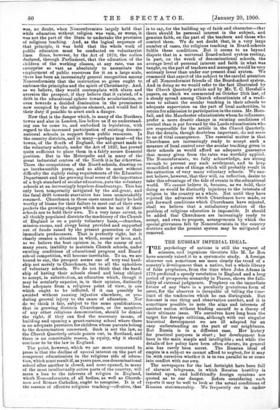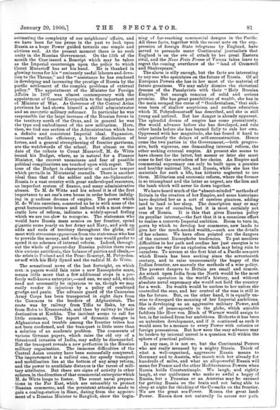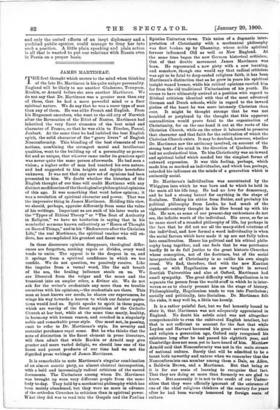THE RUSSIAN IMPERIAL IDEAL.
THE psychology of nations is still the vaguest of sciences, and ingenious theorists like M. Le Bon have scarcely raised it to a systematic study. A foreign observer can sometimes see more clearly the trend of a country's development than a native, but a whole library of false prophecies, from the time when John Adams in 1778 predicted a speedy revolution in England and a long period of prosperous monarchy in France, shows the falli- bility of external judgments. Prophecy on the immediate future of any State is a peculiarly gratuitous form of error, for the observer is incapable of telling the time- limit of the tendencies which he can distinguish. But forecast is one thing and observation another, and it is sometimes possible to note the aims and interests of another nation without binding oneself to a theory of their ultimate issue. We ourselves have long been the target for foreign criticism, although with our singular historical development we are ill adapted for an easy understanding on the part of our neighbours. But Russia is in a, different case. Her history for practical purposes is short ; her development has been in the main simple and intelligible ; and while the details of her policy have been often obscure, its general aim has rarely been secret. The Russian ideal of empire is a subject we cannot afford to neglect, for it may lie .with ourselves whether it is to run parallel to or Come into conflict with our own.
The newspapers for the last fortnight have been full of alarmist telegrams, in which Russian hostility is insisted upon, and half-friendly foreign opinions are quoted as to our danger. Before considering such reports it may be well to look at the actual conditions of Russian statesmanship. We frequently err in upders estimating the complexity of our neighbours' affairs, and we have been far too prone in the past to look upon Russia as a huge Power guided towards one simple and obvious end. At the present moment there is no such unity in the Russian Government. On the 13th of the month the Czar issued a Rescript which may be taken as the Imperial countersign upon the policy to which Count Mnravieff has set his hand. He is thanked in glowing terms for his "eminently useful labours and devo- tion to the Throne," and the "assistance he has rendered in developing and increasing the prestige of Russia by the pacific settlement of the complex problems of external policy." The appointment of the Minister for Foreign Affairs in 1897 was almost contemporary with the appointment of General Kuropatkin to the important post of Minister of War. As Governor of the Central Asian provinces he bad shown himself a skilful administrator and an eneigetic military reformer. In particular he was responsible for the large increase of the Russian forces in the territory north of the Oxus, and in general he was the type and embodiment of the new militarism. Here, then, we find one section of the Administration which has a definite and consistent Imperial ideal. Expansion, increased warlike efficiency, a batter distribution of forces, and a general strengthening of frontier garrisons, are the watchwords of the school. But almost on the date of the tribute to Count Muravieff, M. de Witte issued his Budget, where, as is natural for a Finance Minister, the current uneasiness and fear of possible political complications are touched upon with regret. The tone of the Budget is characteristic of another temper which prevails in Ministerial councils. There is another ideal than that of the soldier and the ex-diplomatist. Russia is a vast country with great undeveloped resources, an imperfect system of finance, and many administrative abuses. To M. de Witte and his school it is of the first importance to set one's own house in order before indulg- ing in grandiose dreams of empire. The power which M. de Witte exercises, connected as be is with none of the great bureaucratic houses and imbued with a most demo- cratic love of reform, indicates a widely-spread feeling which we are too slow to recognise. The statesman who would have Russia mass armies on her frontier, spend gigantic sums yearly on her Army and Navy, and pick up odds and ends of territory throughout the globe, will meet with strenuous opposition from the statesman who has to provide the money, and who in any case would prefer to spend it on schemes of internal reform. Indeed, through- out the whole of present-day Russian politics there runs this curious antithesis, this balance of parties and ideals,— the crisis in Finland and the Pea RA-script, M. Pohyedon- osiseff with his Holy Synod and the radical M. de Witte.
The sensational news of the last fortnight, on which cert oi papers would fain raise a new Russophobe scare, means little more that a few additional steps in a per- fectly well-known enterprise,—and one, we may add, which need not necessarily be injurious to us, though we may easily render it injurious by a policy of combined grudge and panic. The advance guard of the Caucasian Army Corps has been transported in eight days from the Caucasus to the borders of Afghanistan. The route was by railway from Tiflis to Baku, by sea from Baku to Krasnovodsk, and then by railway to their destination at Kushka. The incident seems to call for little comment. The report of dynastic changes in Afghanistan and trouble among the frontier tribes has not been confirmed, and the transport is little more than a solution of an academic problem. The comments of various German papers, which raise the old cry of a threatened invasion of India, may safely be disregarded. But the transport reveals a new perfection in the Russian military organisation. The immense difficulties of the Central Asian country have been successfully conquered. The improvement is a radical one, for speedy transport and mobilisation lies at the bottom of any army reform, and the power to annihilate distance is the rarest of mili- tary attributes. But there are signs of activity in other spheres, in the direction of that commercial enterprise which M. de Witte longs to foster. The recent naval prepara- tions in the Far East, which are ostensibly to protect Russian commerce, and the persistent attempts made to gain a coaling-station in Siam, dating from the appoint- ment of a Russian Minister to Bangkok, show the begin- ning a far-reaching commercial designs in the Pacific. All these facts, together with the recent note on the sup. pression of foreign State telegrams by England, have served to persuade many Continental journalists that England is on the eve of attack by her great Eastern rival, and the Neue Freie Freese of Vienna takes leave to regret the coming overthrow of the "laud of Cromwell and Shakespeare."
The alarm is silly enough, but the facts are interesting to any one who speculates on the future of Russia. Of all European Powers she has in her most of the material of future greatness. We may safely dismiss the rhetorical dreams of the Panslavists with their " Holy Russian Empire," but enough remains of solid and serious promise. She has great possibilities of wealth, she has in the main escaped the curse of " Occidentalism," that sick- ness born of shallow scepticism and surface education which M. Pobyedonostseff has described, and she is still young and untired. But her danger is already apparent. The splendid dream of empire has come prematurely. She would advance before she has developed, and rule other lands before she has learned fully to rule her own. Oppressed with her magnitude, she has found it hard to bear patiently the delays of self-reconstruction. Hence come the two parties in the Government,—both progres- sive, both vigorous, one demanding internal reform, the other seeking external empire. At present she seems to have chosen for the latter, but sooner or later she must come to feel the unwisdom of her choice. An Empire and commercial supremacy can only be built upon a genuine and healthy national life, and Russia, while she has the materials for such a life, has hitherto neglected to use them. Militarism and economic reform, where the former is so triumphant and the latter so urgent, are the lion and the lamb which will never lie down together.
We have heard much of the "absent-minded" methods of Britain in the creation of her Empire, and some historians have depicted her as a sort of careless giantess, adding land to land in her sleep. The description may or may not be true of ourselves, but it is most certainly not true of Russia. It is this that gives Russian policy its peculiar interest,—the fact that it is a conscious effort to realise a concrete Imperial ambition. Room to turn in, ports by which to develop her commerce, new lands to give her the much-needed wealth,—such are the details of her scheme. We have often pointed out the dangers of the current Russophobe tendencies. To put needless difficulties in her path and confine her just energies is to prepare the way for an explosion which may bring ruin to ourselves. To scream at the first hint of a Pacific sea-port which Russia has been seeking since the seventeenth century, and to raise unnecessarily the bogey of the Indian frontier, are scarcely the methods of a wise policy. The present dangers to Britain are small and remote. An attack upon India from the North would be the most difficult operation in the world's history, and without absolute naval supremacy she would not hold the country for a week. Its wealth would be useless to her unless she controlled the seas, and her control of the seas is still in the far future. But, on the other hand, it is equally un- wise to disregard the meaning of her Imperial ambitions. She is developing as an aggressive military Power, and the role of peace-apostle to the globe, which amiable faddists like Herr von Bloch of Warsaw would assign to her, is far indeed from her ambitions. Hitherto it has been an unbroken development, and if it continued as such it would soon be a menace to every Power with colonies or foreign possessions. But how soon the easy advance may be broken by internal unrest is a question well within the sphere of practical politics.
In any case, it is not we, but the Continental Powers who are really menaced by a mighty Russia. Think of what a well-organised, aggressive Russia means to Germany and to Austria, who march with her already fur hundreds of miles, and what an all-powerful Russia will mean for France and the other Mediterranean Powers when Russia holds Constantinople. We laugh, and rightly laugh, at our quiduuncs who make so awful a bogey of Russia, but a Prussian or an Austrian may be excused for getting Russia on the brain and not being able to sleep at night for thinking of the Cossa,cks on the frontier. We are the great sea-Power. Russia the great land- Power. Russia does not naturally lie across our path. and only the united efforts of an inept diplomacy and a purblind public opinion could manage to drag her into such a position. A little plain speaking and plain action is all that is wanted to put our relations with Russia even in Persia on a proper basis.








































 Previous page
Previous page